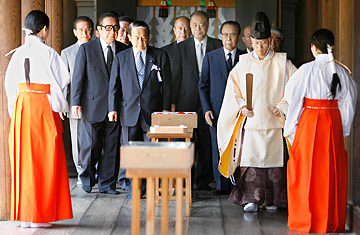
Japanese parliament members visit the controversial Yasukuni Shrine in Tokyo, August 15, 2007, to mark the 62nd anniversary of the end of World War II. Prime Minister Shinzo Abe did not attend.
What a difference a year makes. Early in the morning of August 15 last year, then-Japanese Prime Minister Junichiro Koizumi arrived at Tokyo's controversial Yasukuni Shrine — where Japan's war dead are memorialized — to pay his respects. The date was significant: Aug. 15 is the anniversary of Japan's surrender in World War II, a day of reflection for the Japanese and celebration for much of the rest of Asia. And by visiting that morning, the conservative Koizumi was all but deliberately provoking neighbors like China and South Korea. Koizumi was making a statement that the more confident Japan that he helped forge in his five years in office would no longer have its history dictated to it by outsiders.
Fast forward to Aug. 15, 2007. Koizumi was back at Yasukuni, but his successor Prime Minister Shinzo Abe — a politician who is personally more conservative than Koizumi — was not. Though he's visited the shrine frequently in the past, Abe skipped Yasukuni this year, as did all but one of his cabinet ministers. The Prime Minister wouldn't be drawn out on why he refrained from paying his respects, though the Chinese government has said that Abe agreed to steer clear of Yasukuni in exchange for improving relations between the two nations. Abe brought Beijing and Tokyo back together, but his absence from Yasukuni can be taken as a statement of another sort: that the Koizumi era was the high-water mark for an internationally assertive Japan, and that the nation is turning inward once again.
It wasn't supposed to be like this. Abe came to power boasting that he would remake Japan's postwar system, where the government focused on domestic and economic priorities and left virtually all international and security policy in the hands of its ally, the United States. He boosted Japan's defense agency to a full cabinet-level ministry, flexed the country's muscles after North Korea tested an atomic bomb and made the revision of the country's pacifist constitution a top legislative priority.
But there was an unexpected bump in the road to the new Japan: it turns out that most Japanese actually like the postwar system, which brought them astonishing prosperity while keeping the country out of foreign trouble. Though Japan's economy has continued its long recovery from the stagnation of the 1990s, Japanese fears over growing income disparity and the uncertain future of the fast-aging country deepened this year. Abe's ambitions were at odds with that widespread anxiety — a fact that became graphically clear after the July 29 legislative elections, where the opposition Democratic Party of Japan (DPJ), running on a domestically oriented platform that all but promised to bring back the old and inward Japan, dealt Abe's Liberal Democratic Party a massive loss.
Abe has been floundering in the wake of the election, battling calls for his resignation and promising to respond to voters' domestic demands — putting old priorities like constitutional revision on the backburner. Meanwhile the victorious DPJ has sent clear signals that it would like to see Japan scale back from global affairs even further. The party's head Ichiro Ozawa all but humiliated U.S. ambassador Thomas Schieffer at a meeting last week, refusing Schieffer's request to support Japan's role in Afghanistan's anti-terror operations — and inviting Japanese TV cameras to film his rebuff.
Abe's no-show at Yasukuni — where general attendance this August 15 was thinner than in recent years — was simply the latest step back toward a more disengaged Japan. Dropping Yasukuni is a positive move — the shrine had become a thorn in the side of Japanese-Asian relations, and Abe does deserve some credit for defusing it. But the return of the old Japan shouldn't be welcomed by the rest of the world, or by the Japanese. As China and India rise economically and politically, the power dynamics in Asia are shifting — and Japan should play its part, rather than outsource that role to the Americans. But with the average Japanese more worried about his pension than geopolitics, that seems unlikely.
